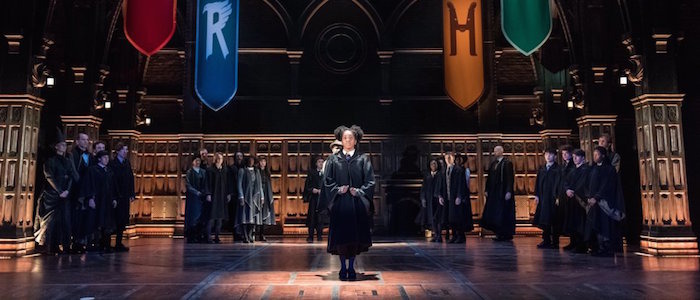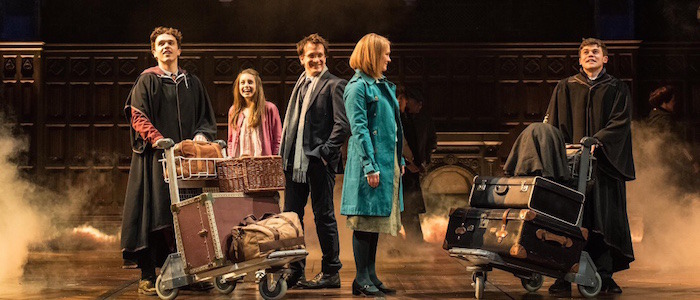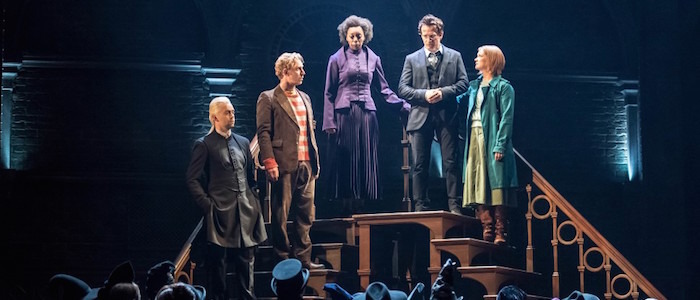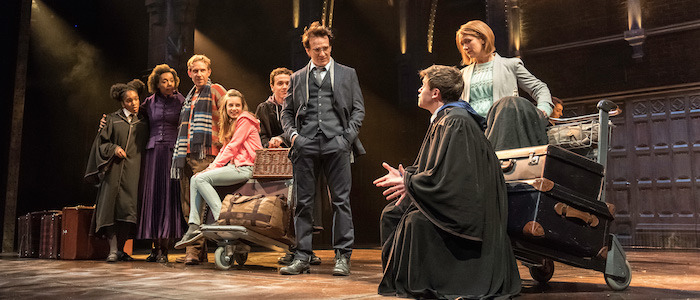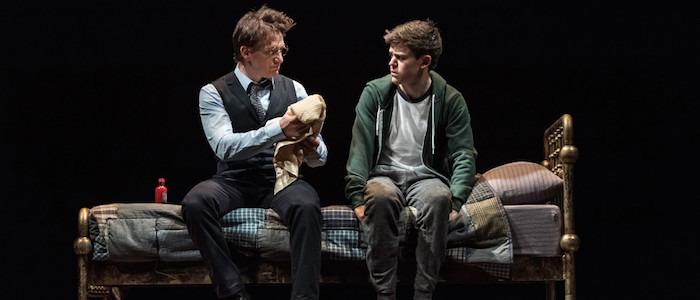A Journey Through Time: Examining 'Harry Potter And The Cursed Child' On Broadway
Broadway's two-part Harry Potter and the Cursed Child production is a fascinating beast. It brings with it most of its West End cast, acting as direct sequel to the books yet trading on the iconography of the film series, all while making its own unique mark on Harry Potter canon. Picking up from the originals' "Seventeen Years Later" epilogue, it follows a new generation of characters – best friends Albus Potter and Scorpius Malfoy, sons of bitter rivals Harry and Draco – across four years of their schooling in a matter of minutes, before diving back into time itself.
Time is central to The Cursed Child, both as a fictional construct as well as a force of nostalgia. The play's relationship to an audience that grew up with these characters is paramount. However, the only "Easter eggs" it trades in are those that, through their exploration, lead to a more complex, more complete understanding of the characters as they enter their middle age. Each adult character – Ron, Hermione, Ginny, but especially Harry and Draco – carries the weight of their past adventures, both the guilt and the glory, in ways that impact their children.
The Story So Far
What is The Cursed Child about, exactly? Well, per the barely contextualized spoilers published in 2016 (spoilers from here on out, of course), it's about Albus and Scorpius time-travelling to events familiar to the audience, amidst a plot involving Voldemort's supposed secret child. Which sounds suitably fan fiction-esque, as many detractors would go on to note based on the spoilers alone. Though the play's status as "fan fiction" – an aesthetic term more than a literal one, owing to J.K. Rowling's involvement – isn't far off the mark. Albus and Scorpius do act as self-insert characters, in a sense, but this works to the play's advantage. They're geeky, angsty outcasts exploring the stories of their childhood, events that unfolded during original characters' lives and defined their own in the process. Two lonely kids trying to live up to their predecessors by entering their decades-old narratives and influencing them from the margins, hoping for a different outcome.
That's what The Cursed Child is "about," most certainly, but what it's about, at its core, is the effect of time on people and relationships.
The two-part play is a powerful father-son story in its written form. The focus of its words – its published manuscript is certainly wordy – is the complicated dynamic between Harry and his younger son Albus, a child he inadvertently overshadows with his fame. Harry, "The Boy Who Lived," is now the boy who defeated Voldemort twice. A brave Gryffindor whose oldest child, the boisterous James, follows easily in his footsteps. Albus however, the quieter son with no affinity for sport, finds himself sorted into Slytherin, a House formerly marked by ambition but now defined (both in-world and by many a fan) by its relationship to evil. Fellow Slytherin Scorpius finds himself similarly overshadowed, albeit for different reasons. His father Draco once aligned himself with Voldemort, a decision that keeps both father and son on the social margins, but rumor has it Scorpius may be the secret heir of Voldemort himself. Whatever the case, Scorpius' peers make him pay for the sins of each of his fathers, both real and presumed. He grows up entirely isolated – but for Albus' friendship, that is.
Witchcraft and Stagecraft
The relationships between these sons and fathers is strained to say the least, but the lens through which they're explored is set up before the play even begins. Upon entering New York's Lyric Theater, one is greeted by a stage that expands deeper than usual – the production reportedly removed 400 seats from the auditorium – a space illuminated by a solitary source. From the rear end of the arched façade, a clock-face beams down on the stage like a spotlight, as if bringing with it sunlight, and promise, from the other side of a window. Flanking this clock are rows of pillars on either side. They move inward to reveal branches whenever the setting shifts to the Forbidden Forest, the location from where most of the characters travel through time. These pillars too are adorned by clocks at their apex with each row forming an arch in turn, connecting the clock faces on stage left to those on stage right, as if drawing a line from cause to effect.
The design is lavish. Its execution, precise. While a handful of scenes oscillate between rushed and stretched, every movement, every interlude and every detail has purpose. Many of the conversations take place between characters atop a pair of stairs, not unlike the moving staircases of Hogwarts castle, as fans may recall. Each flight is wheeled in and rotated, musically, until the characters come face to face, like a second and minute hand meeting momentarily.
The play is rife with sleight of hand, the kind of magical stage production that' an utter delight even for those who disliked the published story. The opening at King's Cross station sees the Potters and Granger-Weasleys charge through the famous magical platform (Nine and Three Quarters), switching from civilian casuals to magical robes within a momentary flash. Actors often transform and transfigure into one another by inhabiting the same cloak, twisting and contorting in partial darkness, often hilariously and to much applause. Numerous wand duels feature hidden stage-hands making objects float, a marvel to behold, but the one trick that seems to garner the most awestruck response is when time runs in reverse.
The Passage of Time
The characters use a pocket-sized Time Turner – first seen in Harry Potter and the Prisoner of Azkaban – to travel into the past. Whenever the characters visit these events (seen in previous books and films), the stage darkens but for their silhouettes and the outlines of the clock-faced arches. The clocks run backwards, scored by recent dialogue fresh in the audience's memory until suddenly, a wave-like effect envelops the backdrop, seemingly moving wood and metal like wind caressing a curtain.
It's disorienting at first, in an awe-inspiring way. It's the kind of trick you don't normally see with the naked eye, but the second or perhaps third time it occurs, the cause of the ripple becomes clearer. Light hits the furthest point of the stage before moving (concentrically, turning the stage into a clock-face of its own) toward the front, along the meticulously crafted backdrop that now reveals its hidden purpose. The result is an impossible, enveloping ripple. Something we ought not to see, as if the fabric of space and time have been infringed upon. It happens five, maybe six times in total, but it never loses its charm.
While the play features no songs, it beats with the distinct vibrancy of a musical. Scene transitions, whether traversing hundreds of miles or perhaps years in the very same spot, feature energetic, choreographed ensembles drawing one into the setting. A semester of lessons on how to conjure spells is turned into dance of light, with kids being led by their illuminated wands. Students populate the background of every scene at the school – that is, until the conversations in focus become private – and the Hogwarts express is a seated row of excited teens being rotated, again, like a clock. The stage never moves, but for the mechanical tricks and contraptions at its center, but we constantly move within it as time ticks on.
These constant flourishes are reminders of the story's foundation, one rooted in the passage of time. While the seven books (and eight movies) that defined the last decade are an important prerequisite, newcomers are filled in on just enough of the backstory through Harry's returning dreams. Moments from his past, enveloped in fog, articulated the origins of Harry Potter. The lies about his parents' deaths. The looming threat of Lord Voldemort. And of course, the exciting promise of magic.
Magic and Reality
That magical promise isn't as exciting to Albus as it was to his father. It brings with it a pair of massive shoes he isn't quite ready to fill. Harry, weighed down by the paperwork of magical law enforcement, tries his best to connect with his son, but they're fundamentally different people. Their love doesn't come easily. When Harry tries to reach out by giving Albus his childhood blanket, it's rejected as an empty gesture in lieu of actual communication. Jamie Parker imbues Harry with a lurking anxiety which, even before he has his first nightmare in decades, makes it seem as if Voldemort could return at any moment.
More importantly, Parker embodies the underlying anger and aggression that Harry harboured in his teen years, though more so in the books than in the films. It's a wound that time hasn't managed to heal (it's gone unconfronted for decades), and young Albus finds himself on its receiving end in a particularly bitter exchange. Perhaps worse than growing up surrounded by stories of Harry Potter is the realization that reality – for Albus, and most certainly for us – is nothing like the childhood tales of adventure. "We're off sugar," Harry says, unable to enjoy the innocent sweets of his youth. The biggest threat to his health is no longer dark wizards, but age.
Harry carries with him the weight of all those who died in his stead. One in particular, Cedric Diggory, gnaws at him when Cendric's father Amos comes to visit. Cedric was ancillary to Harry's narrative, a feeling Albus knows all too well, which catalyzes Albus' decision to travel to the past. By saving Cedric, "the spare" who was killed for being in Harry's vicinity, Albus hopes he can reunite a father and son. Amos with Cedric, no doubt, but perhaps then Albus' own father would see him as a worthy successor. Saving Cedric would also lift a weight off Harry's shoulders and make their relationship easier, or so Albus hopes. Changing his father's past would, in theory, change his own present. It does, though not in the way Albus expects.
Fathers and Sons
Albus and Scorpius' first trip through time has a minor butterfly effect. Albus' cousin Rose no longer exists (Ron Weasley marries Padma Patil in this reality, as opposed to Hermione) and while Albus is finally in Gryffindor as both he and his father desired, it doesn't fix their relationship. Their second trip however, changes history entirely. Their world is ruled by Voldemort and his Death Eaters. Harry died at the battle of Hogwarts. Albus no longer exists, leaving Scorpius to fix time. Things are worse than they've ever been, and Scorpius ("The Scorpion King" in this reality) sees, reflected in how others fear him, a version of himself he detests. He would rather Draco's defeat still turn him into a bookish outcast, than become a tyrant alongside his father.
Anthony Boyle's Scorpius is undoubtedly the production's highlight, bubbling with a familiar, nervous energy turned up to eleven. When he's introduced he sits hunched over, as if carrying the weight of his father's moral failings decades ago. Draco (Alex Price) carries a similar weight, though he's trained himself to hide it behind his eyes. Scorpius on the other hand, buries himself in his books, shuffling awkwardly (and hilariously) through the Hogwarts halls, hiding his emotions until someone – usually Albus – allows him to be himself. His awkwardness soon turns to uncontrollable elation. Were this a musical, his lines, often spoken in enthusiastic screeches, would be lyrics sung out of tune. And it would fit like a glove. Boyle's Scorpius is a cacophony of conflicting emotions, colliding nervously thanks the constant awareness of his past, not to mention that of his father's.
The play's final act begins when Albus and Scorpius, having been stuck decades in the past, find a way to send a message to their parents in the future. The pair is trapped in the early '80s – specifically, the night Harry's parents were killed and he was left only with his mother's blanket. It's the solitary heirloom Harry received from his mother, and the only physical symbol of her loving sacrifice. Albus, finally understanding what the blanket means to his father, embroiders a message for him to find. As Albus comes up with the plan, pacing around the blanket forty years in the past, Harry finds the message in the present, with both scenes staged concurrently. In a moment of mutual understanding, separated by decades, time as we perceive it folds in on itself. Love, made tangible, transcending the boundaries of time.
The climax features Harry witnessing his parents' murder. He does so willingly, as attempting to change the past has already resulted in untold horrors. Nothing Albus or Scorpius can do, no amount of meddling with history, can change their fathers for the better. And as much as it's on the kids to come around to this idea, the responsibility to mend bridges lies equally, if not more so, on Harry and Draco. Amidst the pursuit of their missing sons, they put aside the enmity of their past, helping each other understand their respective failings as parents, like old wounds finally being closed. Time moves, often in unpredictable ways, but the past is always set. These fathers and sons can't change the past no matter how hard they try, but it's in confronting time, and in dealing with the emotional fissures that time has left them with, that they can begin to move forward together.
The final scene is perhaps the production's most touching. The central clock-face returns, this time filling the entire stage with sunlight. The suitcases that once adorned the Hogwarts express are now set up like headstones – journeys cut short – in a graveyard for students killed on Hogwarts grounds. Many of these deaths rest on Harry's conscience. A more recent one rests on Albus', but their pain and guilt is something they share. It's an imperfect commonality, but it facilitates an emotional handshake that promises effort and understanding on both their behalves, if nothing more. Harry and Albus don't exist on the same page, and they may never, but their fears and regrets make them human enough to reach out, helping each other deal with the weight as they discuss – perhaps for the first time – what makes them afraid.
The past has had its say. The future and all its complications, glowing from the other side of the clock, is their next adventure. At the very least, they'll embark on it together.

